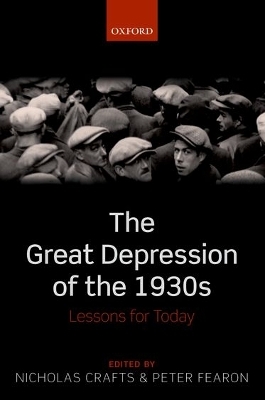
The Great Depression of the 1930s
Oxford University Press (Verlag)
978-0-19-878278-0 (ISBN)
Understanding the Great Depression has never been more relevant than in today's economic crisis. This edited collection provides an authoritative introduction to the Great Depression as it affected the advanced countries in the 1930s. The contributions are by acknowledged experts in the field and cover in detail the experiences of Britain, Germany, and, the United States, while also seeing the depression as an international disaster. The crisis entailed the collapse of the international monetary system, sovereign default, and banking crises in many countries in the context of the most severe downturn in western economic history. The responses included protectionism, regulation, fiscal and monetary stimulus, and the New Deal. The relevance to current problems facing Europe and the United States is apparent.
The chapters are written at a level which will be comprehensible to advanced undergraduates in economics and history while also being a valuable source of reference for policy makers grappling with the current economic crisis. The book will be of interest to modern macroeconomists and students of interwar history alike and seeks to bring the results of modern research in economic history to a wide audience. The focus is not only on explaining how the Great Depression happened but also on understanding what eventually led to the recovery from the crisis. A key feature is that every chapter has a full list of bibliographical references which can be a platform for further study.
Nicholas Crafts is Professor of Economic History at the University of Warwick and Director of the ESRC Competitive Advantage in the Global Economy Research Centre (CAGE). He has held positions at the London School of Economics, UC Berkeley, Stanford, and Oxford. He is a Fellow of the British Academy and has been a consultant to many organizations including HM Treasury, IMF, and the World Bank. Peter Fearon is Emeritus Professor of Modern Economic History at the University of Leicester. He has published widely on the great depression with a particular emphasis on the US economy and the New Deal. He has held visiting positions at the University of Cambridge, the University of Kansas, and La Trobe University.
1: Nicholas Crafts and Peter Fearon: Depression and Recovery in the 1930s: An Overview
2: Nicholas Crafts and Peter Fearon: The 1930s: Understanding the Lessons
3: Nikolaus Wolf: Europe's Great Depression: coordination failure after the First World War
4: Albrecht Ritschl: Reparations, Deficits, and Debt Default: The Great Depression in Germany
5: Forrest Capie: Disintegration of the International Economy between the Wars
6: Charles Calomiris: The Political Lessons of Depression-era Banking Reform
7: Michael Bordo and John Landon-Lane: The Banking Panics in the United States in the 1930s: Some Lessons for Today
8: Roger Middleton: Can Contractionary Fiscal Policy be Expansionary? Consolidation, Sustainability, and Fiscal Policy Impact in Britain in the 1930s
9: Price Fishback: US Monetary and Fiscal Policy in the 1930s
10: Price Fishback and John Wallis: What was New about the New Deal?
11: Timothy J. Hatton and Mark Thomas: Labour Markets in the Interwar Period and Economic Recovery in the UK and the USA
12: Alexander J. Field: Economic Growth and Recovery in the United States: 1919-1941
13: Kris James Mitchener and Joseph Mason: Blood and Treasure: Exiting the Great Depression and Lessons for Today
14: Barry Eichengreen and Peter Temin: Fetters of Gold and Paper
| Erscheinungsdatum | 22.07.2016 |
|---|---|
| Zusatzinfo | 50 Figures, 33 Tables |
| Verlagsort | Oxford |
| Sprache | englisch |
| Maße | 154 x 233 mm |
| Gewicht | 718 g |
| Themenwelt | Geschichte ► Teilgebiete der Geschichte ► Wirtschaftsgeschichte |
| Wirtschaft ► Volkswirtschaftslehre ► Finanzwissenschaft | |
| Wirtschaft ► Volkswirtschaftslehre ► Makroökonomie | |
| ISBN-10 | 0-19-878278-0 / 0198782780 |
| ISBN-13 | 978-0-19-878278-0 / 9780198782780 |
| Zustand | Neuware |
| Haben Sie eine Frage zum Produkt? |
aus dem Bereich


